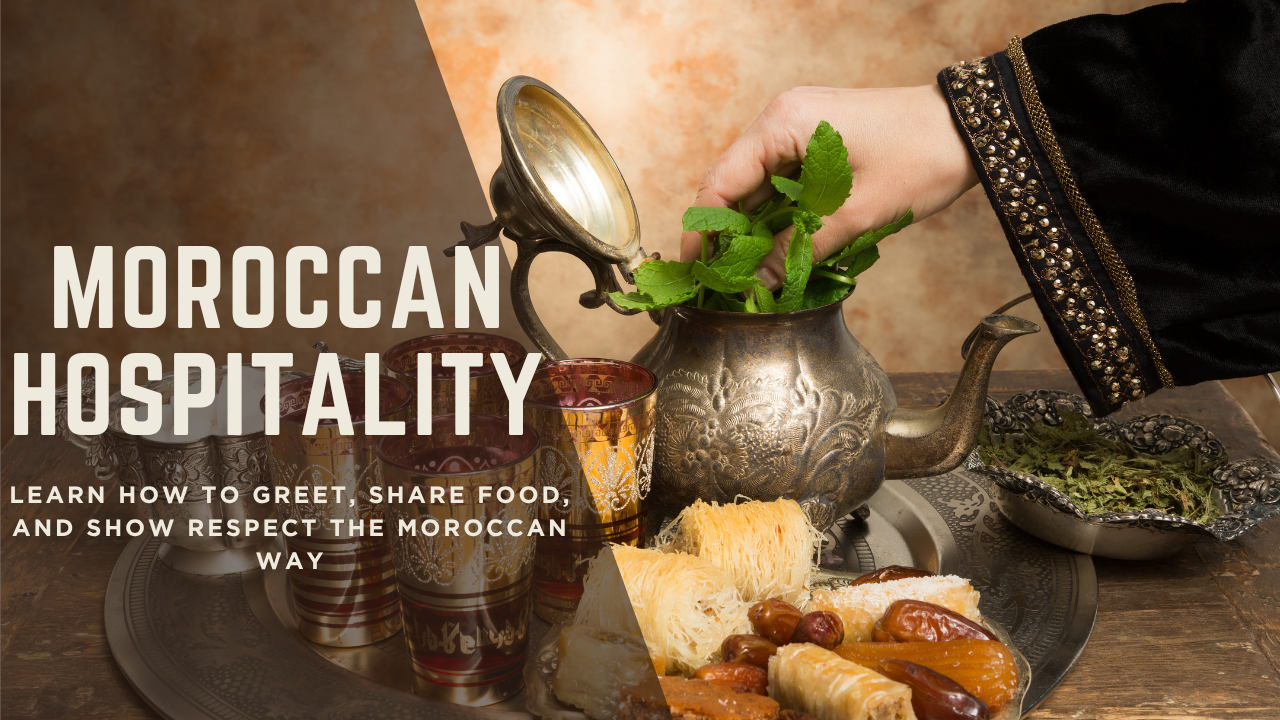Moroccan Hospitality and Guest Etiquette in Darija

Moroccan Hospitality and Guest Etiquette in Darija
Introduction
In Morocco, hospitality isn’t just a custom — it’s a way of life.
From the moment you step into a Moroccan home, you’re treated like family. Whether it’s a cup of mint tea, a shared meal, or a warm smile, Moroccans take pride in making guests feel truly welcome.
In this post, you’ll explore Moroccan hospitality traditions and learn the Darija phrases and expressions you can use to show respect and appreciation when visiting Moroccan homes.
“Dkhol, tfadal!” — The Moroccan Way of Welcoming Guests
The moment you arrive, you’ll probably hear:
“Tfadal!” "Dkhol" — Come in / Please!
“Ahlan!” — Welcome!
It’s common for hosts to warmly insist you enter, even if you’re just passing by. Refusing once or twice is polite — but they’ll always invite again.
Darija Vocabulary:
| Darija | Meaning |
|---|---|
| Tfadal / Tfadli | Come in (m / f) |
| Marhba bik / bikom | Welcome (to you / you all) |
| Dkhol | Enter |
| Ldar | The house |
| Dyaf | Guests |
The Ritual of Mint Tea — Atay
If there’s one thing that defines Moroccan hospitality, it’s Atay b na3na3 (Mint Tea).
Tea isn’t just a drink — it’s a symbol of generosity, friendship, and connection.
When you visit someone’s home, the host will prepare and serve tea beautifully, often pouring it from high above the glass — a sign of respect and skill.
Darija Phrases:
-
Ghadi nsharbo atay. → We’re going to drink tea.
-
Atay b na3na3 bnin! → The mint tea is delicious!
-
Shukran 3la atay. → Thank you for the tea.
💡 Cultural Tip: Always accept tea when offered — refusing can be seen as impolite unless you have a strong reason.
Sharing Food — “Kol, kol!”
In Moroccan culture, food is shared — it’s an expression of love and community.
Meals are often eaten from a shared dish, especially tajine or couscous.
You’ll often hear your host say:
“Kul, kul!” — Eat, eat!
“Bsa7a!” — Enjoy your meal!
“Allah ya3tik sa7a.” — May God give you health.
Darija Vocabulary:
| Darija | Meaning |
|---|---|
| Tajine | Traditional Moroccan dish |
| Mida/Tebla | Table |
| Khobz | Bread |
| Bsa7a | Bon appétit / Enjoy your meal |
| Kul | Eat |
💡 Cultural Tip: Always wash your hands before eating, and use your right hand when sharing food from a communal plate.
Saying Goodbye — “Beslama!”
When it’s time to leave, hosts usually walk guests to the door, often repeating:
“Beslama!” — Go in peace / Safe travels!
“Tji m3a lkhir.” — May you come again with good things.
It’s also polite to thank your hosts warmly before leaving.
Useful Phrases:
-
Shukran 3la diyafa. → Thank you for the hospitality.
-
Lah ykhalik. → May God protect you.
-
Thala f rask. → Take care of yourself.
Cultural Insight: The Spirit of Diyafa
The word “diyafa” means hospitality, but in Morocco it goes beyond that — it’s a moral and spiritual duty.
Hosts see it as an honor to serve others. Guests, in turn, show gratitude with kind words and blessings.
It’s a beautiful exchange that defines Moroccan culture: warmth, respect, and generosity.
Learn Darija Through Moroccan Culture
Understanding Moroccan Culture and hospitality helps you learn how Moroccans think, speak, and connect — it’s real language in action.
In the Daily Darija Course, you’ll learn not only the words, but the cultural context behind them — through real-life dialogues and examples.
🫖 Join the Daily Darija Course and start learning how to speak naturally like a Moroccan guest or host!
Final Thoughts
Moroccan hospitality is more than tradition — it’s a reflection of kindness and connection.
When you visit a Moroccan home, you don’t just enter a house — you enter a family’s heart.
By learning the Darija expressions used in these moments, you’ll not only speak Moroccan Arabic — you’ll feel Morocco.
So next time you hear “Tfadal/Tfadli, Atay kaytsana!”, you’ll know what it means:
“Come in, the tea is waiting!”

